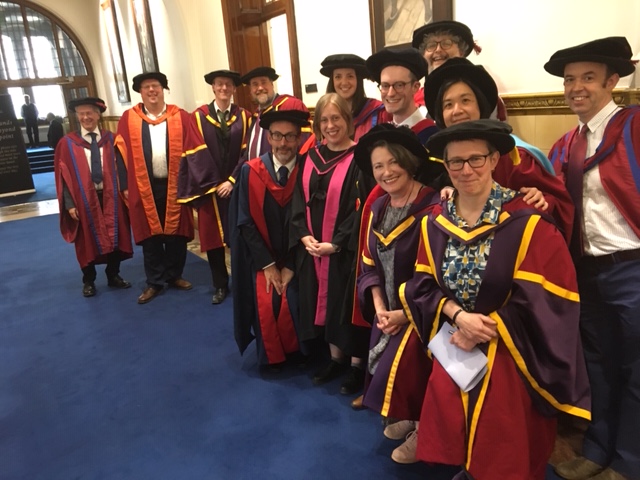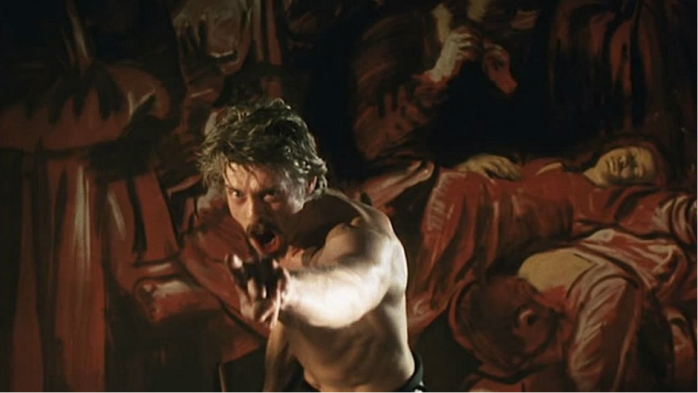
Blog post by Jenny Hughes, Head of Drama
It was good to celebrate graduation with the ‘Class of 2019’ last week – many congratulations to every single one of this year’s graduates. It was my second year of playing the role of ‘presenter’ – of having the honour of reading the names of each of our graduates as they came up onto the podium to accept their degrees. The Head of Department gets to do this each year and it is a real highlight of the year. Before being a presenter for the first time, I had considered sharing the role with other members of Drama staff throughout my tenure as Head of Department. The joy should be shared! But, well, no … I did not engage in this act of generosity this year, and suspect that the same will occur next year. Sorry, colleagues!
For the ceremony this year we were paired up with our friends and colleagues from the Music Department, which made for good, rowdy event. I’m pleased to report that Drama students upheld the tradition established by previous Drama graduates of celebrating their peers’ achievements more joyously (noisily) than, I believe, any other ceremony at the University last week. We had a full contingent of Drama staff to add to the noise (although with more decorum, of course). See above – a photo of staff lining up outside the Whitworth Hall, ready to process!
This year’s prize winners …
I want to preface this by saying that we have mixed feelings about individual prizes here in the Department. So many of students contribute so much in their three years here and we welcome the way that this reflects the collective ethos of the art-forms that we study, as well as the culture of the Department and our values as teachers and researchers. That said, it felt wrong, sitting in graduation ceremonies with Departments that do award prizes over the years, to not take an opportunity to celebrate our graduates. There were some lovely whoops and gasps when our prize-winners were announced this year, and it’s always entertaining to see the (often awkward and slightly pained) looks on winners’ faces as prizes are announced.
The prize-winners this year were as follows:
The Viv Gardner Prize for Outstanding Academic Achievement was awarded to Sassy Holmes.
The David Mayer Prize for Outstanding Dissertation was awarded to Georgia Brown.
These two awards are decided on the basis of academic excellence – they go the student with the highest overall spread of marks in academic work over the final year (Sassy) and to the Final year research project that achieved the highest mark (Georgia). Sassy’s work in third year was nothing short of outstanding, and what was really notable was her excellence across the study of theatre and film, and study and practice modules. Georgia Brown’s Research essay, entitled ‘Towards a Minimum Unit: Late Beckett and the Via Negativa’, was a fantastic piece of work, called ‘an elegant, well-researched and beautifully written’ by the first marker.
The Tony Jackson Prize for Outstanding Student Citizenship was awarded to Jordan Jones. This prize is decided by Drama department staff and given to the student who has, in our view, contributed the most to the life of the Department over the degree period. Jordan was awarded the prize for his work on the Staff-Student Liaison Committee, peer mentor, student ambassador and for being an all-round positive and constructive member of the student body. Throughout all three years of his degree, Jordan enhanced the sense of fellowship throughout the Drama Department and across the wider community of the University, through his work with both Drama Society and the Music Theatre Society.
The Meera Syal Prize for Outstanding Practical Work was shared by Ayden Brouwers, Elizabeth Morris, and Emily Tandy. Ayden and Lizzie’s award was in recognition of their performance work on our intensive third year contemporary theatre-making module, led by theatre-maker and lecturer, Andy Smith. Any new first years reading this – you will be able to see Ayden and Lizzie’s Sound Cistem, which began life on Andy’s course, and is shortly to play Edinburgh Fringe – as it will be our welcome week show this year! Andy Smith said: ‘Ayden and Lizzie made a piece of work that felt really of its moment. It developed and took on methodologies and had a clear sense of its antecedents whilst remaining absolutely of and for its makers. It contained the personal and the political.’
Emily was awarded the prize in recognition of her work to strengthen the links between Drama and Music practice, and for developing a movement-based practice as part of her final year research project. It was also awarded for her beautiful interpretation of Angels in America for her final year Directing module. Our Directing course is led by Artistic Director, Gwenda Hughes, who said of Emily’s direction: ‘an excellent piece of work, simply but attractively designed and beautifully staged. The dialogue was clear and sharp with attention paid to the specificity of the text, eliciting very good performances from the cast.’ Emily’s directorial work showed creative maturity, a confident and distinctive aesthetic, and rigorous, detailed work with her actors.
Thanks to the Class of 2019 for three great years – we will miss you, and good luck with next steps. Please keep in touch – send me your personal email address if you’d like to – I regularly get sent opportunities for graduates, and it can be handy to have direct email addresses. Also, join our UoM Drama alumni facebook page here – https://www.facebook.com/groups/124061231629085/

 Stills from Caravaggio from:
Stills from Caravaggio from: 
